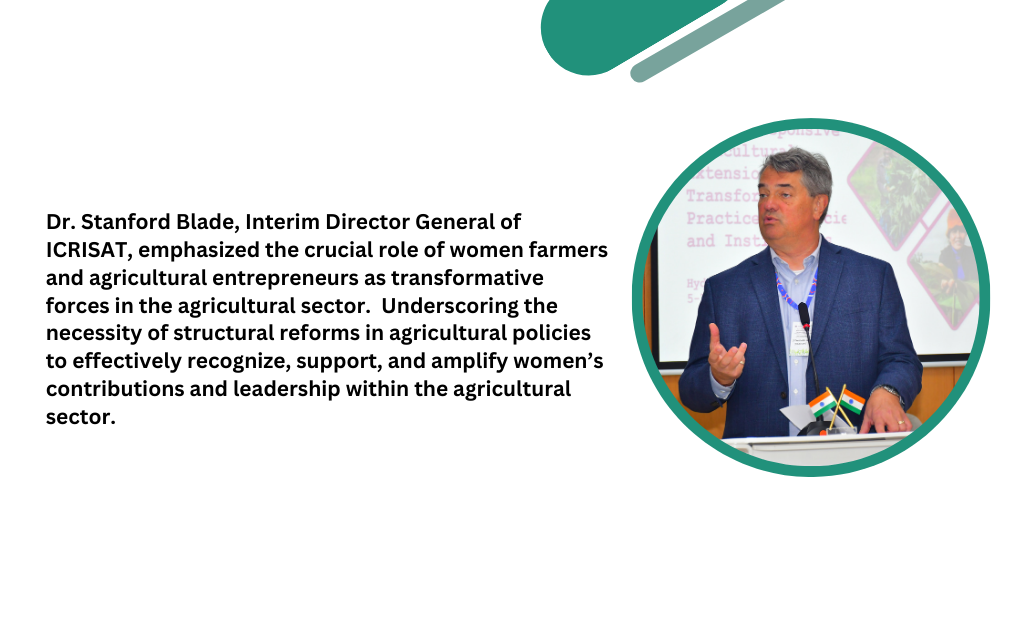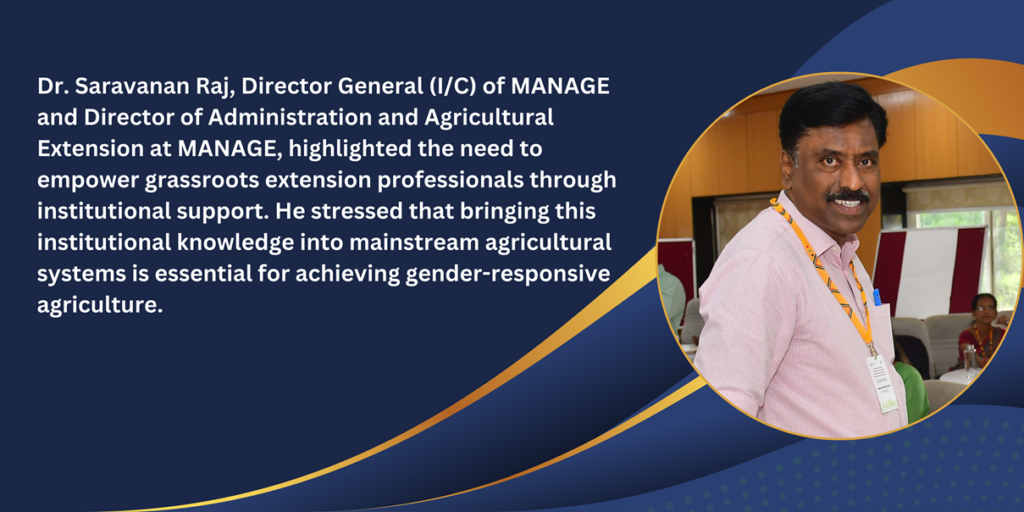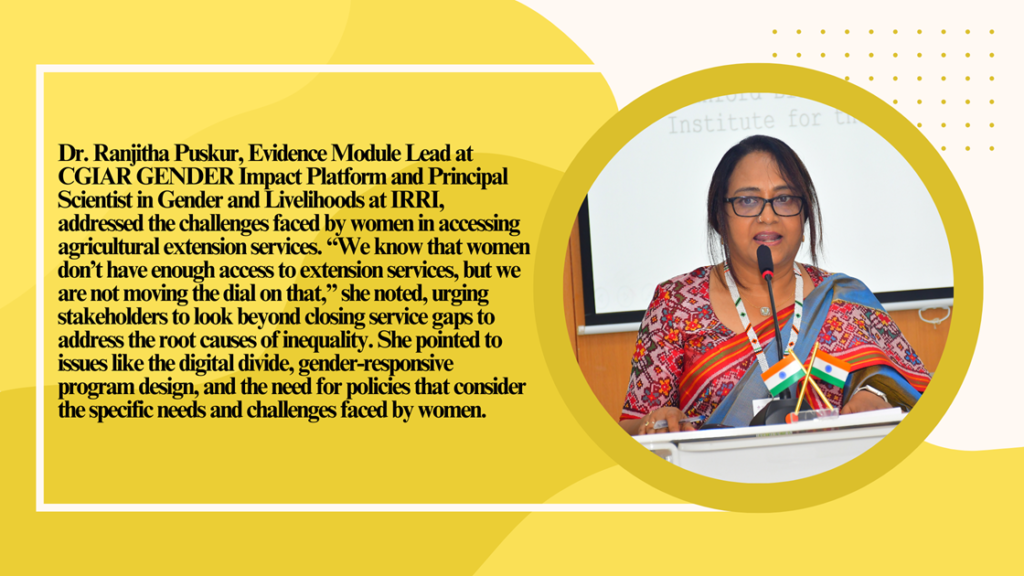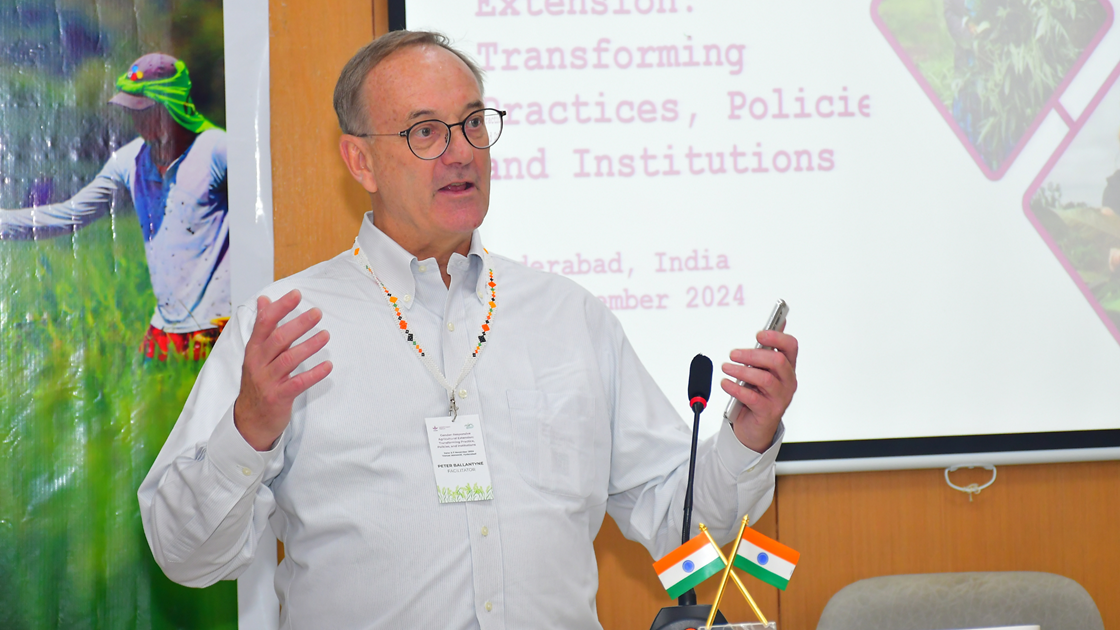I recently had the privilege to attend the International Workshop on Gender-Responsive Agricultural Extension: Transforming Practices, Policies, and Institutions, hosted by the CGIAR GENDER Impact Platform and the National Institute of Agricultural Extension Management (MANAGE). Held from 5–7 November in Hyderabad, India, this workshop gathered global thought leaders, practitioners, and policy influencers committed to advancing gender equality in agricultural extension systems. The experience not only deepened my understanding of the gendered dimensions in agriculture but also inspired me to work on actionable steps toward creating a gender-inclusive agricultural extension ecosystem in my community.
The workshop aimed to address the critical need for gender-responsive extension and advisory services (EAS) by facilitating equal access to resources, tools, and technologies for both men and women farmers. The emphasis was on integrating gender-sensitive policies and practices into agricultural extension systems, acknowledging the distinct roles and contributions of women in agrifood systems, especially in the face of climate change and rapidly evolving food systems. Here, I will outline the key takeaways and strategies that inspired me to bring about change in my own work.



The opening remarks from these esteemed leaders set a powerful tone for the workshop, urging attendees to work collectively towards actionable solutions that would close gender gaps and create equitable, inclusive agricultural systems. By engaging in open dialogue and exploring innovative strategies, the workshop participants are poised to drive transformative change in EAS delivery, paving the way for a future where women farmers have the resources, recognition, and opportunities they deserve in agriculture.
Key Elements for Building Gender-Responsive Agricultural Extension Systems:
To make agricultural extension services more inclusive and effective, there are several crucial factors to keep in mind:
- Intention
Achieving gender equality in agricultural extension requires an intentional commitment to address the unique needs and challenges that women face in accessing extension services. From the outset, every policy, program, and intervention must be designed with the intention to empower women as equal contributors and beneficiaries in agriculture. - Commitment
Institutional and individual commitment is essential. This includes dedication from government bodies, NGOs, and private sector players to champion gender equality as a core objective, continually advocating for policies that prioritize women’s access to resources and services in agriculture. Commitment from private players was showcased by Vinny M. Rice Venture Lead, Bayer. - Partnership/Collaboration:
Collaborative partnerships across sectors are vital. The workshop highlighted the importance of linking local and international organizations, research institutions, and community groups to foster a multi-faceted approach. These partnerships amplify the reach and impact of gender-responsive programs and ensure that best practices are shared and implemented widely. The success of the Odisha Millets Mission lies in its multi-stakeholder collaboration and partnerships, with a focused commitment to placing women at the center of its initiatives. - Adaptation
Agricultural extension services must be adapted to the varying needs of women across different contexts. Tailoring these services involves understanding local socio-cultural norms, existing barriers, and specific needs, ensuring that both content and delivery methods align with women’s realities in different agrifood systems. Prapti Barooah, Senior Research Analyst in the Natural Resources and Resilience Unit at IFPRI, emphasized that meaningful progress cannot be achieved without addressing underlying social norms. - Conceptualization
Creating a conceptual framework for gender-responsive EAS is crucial for building a shared understanding among stakeholders. This involves integrating gender-responsive practices at the core of extension strategies, policies, and curricula, ensuring that these principles become foundational elements in all agricultural extension services. - Capitalization
It is important to capitalize on existing resources and successes. By leveraging previous knowledge, successful models, and community strengths, we can ensure that efforts toward gender inclusivity are both resourceful and impactful. This also includes securing funding and resources that specifically support women in agriculture. - Learning from Failures
Progress is often built upon the lessons learned from failures. Embracing this mindset fosters a culture of innovation and resilience. The workshop emphasized the value of analyzing past shortcomings in gender-responsive initiatives, as this learning process can reveal insights that guide more effective approaches in future efforts. - Content Development
Developing gender-responsive content is essential for effective communication and capacity building. Content must be clear, relevant, and responsive to the distinct challenges and opportunities that women face in agriculture. Through this tailored approach, extension services can directly address issues affecting women’s productivity and empowerment in agriculture. It was emphasized by Max (Olalatau) Olupot, Managing Director, African Centre for Field Schools and Innovation (ACFiSIC). - Seed System – Decentralization
Decentralizing seed systems is an effective way to support women in agriculture. By making seed systems more accessible and manageable at the community level, we can ensure that women have access to high-quality seeds and resources without the need to rely on centralized, often inaccessible, services. Decentralized seed systems can empower women to take an active role in managing their own agricultural resources.
Inspiring Story of Women and Collaboration: Watermelon Cultivation brought smile on the face of tribal farmers in Koraput
Moving Forward with Gender-Responsive Agricultural Extension:
This workshop reinforced my resolve to promote gender-responsive practices within my community and to work toward transforming agricultural extension systems. By focusing on the principles of intention, commitment, partnership, adaptation, conceptualization, capitalization, learning from past efforts, and decentralized seed systems, we can collectively build a future where women have an equal and active role in agriculture.
The strategies and insights shared at the workshop have strengthened my vision for a more equitable agricultural system. By engaging stakeholders, adapting services to meet women’s specific needs, and advocating for gender-sensitive policies, I am committed to fostering change within my community. It is through these concerted efforts that we can drive meaningful transformation, ensuring that women in agriculture are supported, recognized, and empowered to contribute fully to the agrifood systems that sustain us all.
Author: Tapas Chandra Roy, Block Agriculture Officer, DA&FE, Govt. of Odisha. Documenting and disseminating success stories of farmers to inspire millions of farmers across India.
If you wish to submit any inspiring stories of farmers, you can send them to this email address: hello@theagristories.com. Please ensure your submission includes a Word document and high-resolution photographs.

